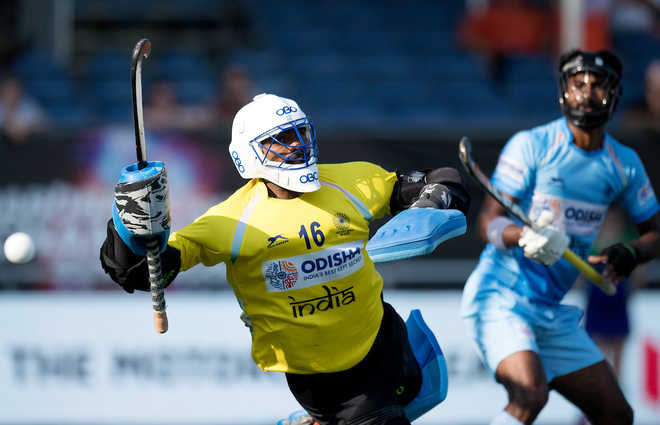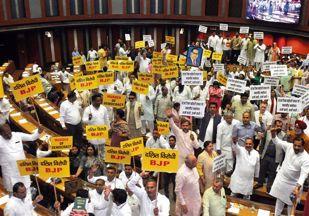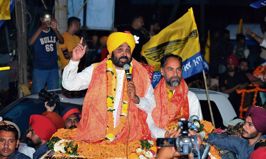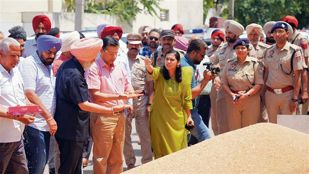
PR Sreejesh’s return to form is a good sign for the Indian team as it will improve their morale. HI
Indervir Grewal
Tribune News Service
Chandigarh, july 17
The progress of the Indian men’s hockey team is back on track. Not that it had derailed — as was feared after of the Commonwealth Games — but the solid performance at the Champions Trophy has quelled any doubts.
The silver medal in Breda, Netherlands — their second successive second-place finish in the Champions Trophy — reassured everyone that the below-par fourth-place finish at the Gold Coast CWG was just a hiccup, albeit one which cost a coach his job. Apart from that drastic step, it took a motivator, a few tweaks in the team and its playing style, and the return to form of one player to bring about a perceptible change in India’s performance in such a small time.
Motivator
From the time he had taken over, Sjoerd Marijne proclaimed that he would transfer responsibility to the players. His “player-driven” system seemed to have been a welcome change after the players had criticised Roelant Oltmans’s autocratic style. But after the CWG disappointment, it came out that the players had lost faith in Marijne’s coaching style, even before the Gold Coast event. The Dutchman’s team selection was also questioned. There were also reports of a rift in the squad. It was presumed that Marijne had lost control of his players and, therefore, the team lost its discipline.
After joining, new coach Harendra Singh’s first task was to bring unity and confidence back into the team, which had been panned for the CWG flop show. The 52-year-old is known for giving motivational speeches, though overdramatic at times. “One of the best parts about him (Harendra) is that he really motivates and pumps up the players. He is gifted with using the right words just before players walk on to the field,” captain PR Sreejesh said after the team’s return. Defender Varun Kumar said the coach kept reminding everyone to “play as a team”. And India did put up a collective fight against the world’s top teams, especially when defending.
‘Focus on defence’
Varun said that Harendra gave more importance to improving the defence. “He believes that good defence wins you matches,” said Varun. The 22-year-old added that Harendra made changes in the defensive structure, with “more emphasis on man-to-man marking”. Also, Chris Ciriello has settled into his role as the team’s analytical coach, evident from the former Australian defender’s conspicuous participation in discussions during the matches.
Sreejesh back in form
However, despite the improved performance, the team’s defensive frailties remain. A big reason for the difference in India’s results at the CWG and Champions Trophy was captain Sreejesh. In the CWG — which was his first tournament after a long injury layoff — Sreejesh was poor for his standards. In the Champions Trophy, he was back at his best. Sreejesh was India’s saviour time and again, for which he won the tournament’s best goalkeeper award.
Defined roles
Sreejesh’s return to form will also improve the team’s morale. With his own confidence rising, he will be able to reclaim his role as the team’s leader and control the defence better. Making Sreejesh the captain has also helped reduce the burden on Manpreet Singh, who had taken the role too seriously. As skipper, Manpreet took it upon himself to carry the team to victory. As part of the leadership group in Marijne’s player-centric system, it seemed Manpreet was desperate to justify every team decision. It affected his game — he was all over the pitch, trying to be a one-man show.
After he was removed from captaincy, Manpreet said it was a “blessing in disguise”. In the Champions Trophy, he was his usual self again, inconspicuously moving the game along and popping up with crucial contributions at the back, in the midfield and the offensive third.
Manpreet was also forced to push harder because of a flawed team selection. Marijne’s team was criticised for its inexperience. Harendra brought back a few senior players, while retaining a few youngsters. But it was the defining of the players’ roles that worked in the Champions Trophy. Youngster Vivek Prasad — who was too inexperienced to control the midfield in the CWG — was moved forward. He scored the equaliser in the final. Sardar Singh was back in the midfield, but as the free player in charge of covering zones. While attacking, he released the ball early, and while defending, he wasn’t assigned any marking duties; but the presence of an experienced player in the centre made a big difference.
One of Harendra’s best selections turned out to be that of Jarmanpreet Singh. The 22-year-old was a crucial part of Harendra’s junior India team, but missed out on the World Cup due to a suspension. Harendra gave him his senior debut and Jarmanpreet justified the coach’s decision. India have struggled to find a right-half with attacking ability and Jarmanpreet made the crucial position his own.
His understanding with former Surjit Academy and junior India teammates Varun, Harmanpreet Singh and Mandeep Singh benefitted the team. Decisions like these help raise a team’s confidence.
Too early for World Cup talk
The team’s good performance has also led to talks about India’s chances at the World Cup. These talks are premature. With the World Cup scheduled in December, all the top teams at the Champions Trophy kept their cards close to their chest. The teams were experimenting and there was a lack of understanding. There were few set-plays and, surprisingly, more haphazard running with the ball. What made this edition — also the final — the best in many years was the teams’ willingness to play fearless, adventurous hockey. It was a perfect farewell for one of hockey’s most revered tournaments. Though it doesn’t take the credit away from India, it puts the second-place finish in perspective. India’s shortcomings — their defensive frailties, weak and unsettled midfield, misfiring forwardline and over-reliance on a fast counter-attacking style — were there to see in Breda, and will most likely be exploited in Bhubaneswar in December. What about the Asian Games? India, at world No. 5, are Asia’s top team, and the next-best are Malaysia, Pakistan and South Korea, at No. 12-14. These teams will challenge India at the Asian Games, but if India play to potential, the gold should be theirs.



























